Nobody knew at the time: I don’t think many people know now, but I really did save the Young Vic Theatre in London from at least partial destruction.
In the mid-1970s I was a student at Leeds University. I joined the drama society and found myself playing a lunatic in a production of Marat: Sade, which was a play about Marat and the French Revolution, supposedly enacted by the inmates of a lunatic asylum. I found it a rather depressing piece but the music, by Leeds composer Roger Quick, then a student there, was excellent and I can still remember much of it, along with the lyrics.
Marat we’re poor and the poor stay poor
Marat don’t make us work any more
We want our rights and we don’t care how
We want a revolution – NOW!
It was, I believe, rather a good production. The director was one of the drama lecturers and the girl playing the leading role of Charlotte Corday was – surprise, surprise! – his girlfriend, or perhaps his wife, I forget. Anyway, the production was chosen for the National Student Drama Festival in London.
I remember two main things about this. Firstly, in a student cast, one actor was not very good and the director shamelessly ditched him before the London transfer. Exactly what a commercial director would do, of course – but I thought at the time, and still think now, that the production had been chosen as it was, and should transfer like that, because after all it was a student production. Quite a few of us kicked up a bit of a fuss about this, to no avail at all.
Secondly, the director’s girlfriendorwife was a couple of months pregnant when the play was on in Leeds. By the time it transferred to London, five months later, the line “An untouched virgin stands before you” was not making a lot of sense, but I notice that the director didn’t get rid of her.
The play ran for a week at the Young Vic Theatre and I had a lovely time. I was staying at a friend’s flat: she was out at work during the day and I went off exploring London on my own, wandering round all the galleries and museums at my own pace – I particularly enjoyed the National Portrait Gallery, I remember.
Our costumes consisted entirely of cotton straitjackets with long, dangly sleeves and I also clutched a little rattle in a stereotypical lunatic-like way. There were about fifteen of us in the fetching chorus of lunatics and we had our own, lunatical dressing-room which would be untidily strewn with straitjackets with our names sewn into them.
One night we had all left the building after the show and the caretaker was locking up after us when I remembered that I had left my bag in the dressing-room. A very uncharacteristic move for me, this, as I am known for having whatever handbag I am currently using welded to my arm.
However, the caretaker opened the darkened theatre for me and I rather nervously made my way to the dressing-room. As I approached our dressing-room I could see a crack of light round the door - someone had left all the lights on – the light bulbs over the mirrors which provided light for make-up.
I could smell burning. Someone had left their straitjacket draped over a light bulb and as I opened the door, it burst into flames. I grabbed it and hurled it into a sink, and turned the tap on until the fire went out. As heroic save-the-world acts go, it wasn’t particularly difficult.
One more minute, however, and the whole room would have been on fire, probably swiftly followed by the rest of the theatre. I told the caretaker what had happened and he displayed complete lack of interest. “Yes, dear, now let’s all go home.”
The next night one of the lunatics complained that his straitjacket was in the sink with a big burn hole in it. I explained what had happened. He too displayed complete lack of interest, other than in the fact that he didn’t now have a costume. Luckily there was a spare straitjacket and the show went on.
If anyone wants to give me an award for saving one of London’s best-loved theatres, I’d still be happy to accept it.






 So, when Emily was little, we knew she would get bored long before the end of the meal: but one thing would, we knew, keep her happy and that was a good book. So we got into the habit of taking books down to dinner and reading to her in between courses. When she was very little we would have a huge, teetering pile of picture books. Later it dwindled to a couple of books we could read to her: and then to books she could read to herself.
So, when Emily was little, we knew she would get bored long before the end of the meal: but one thing would, we knew, keep her happy and that was a good book. So we got into the habit of taking books down to dinner and reading to her in between courses. When she was very little we would have a huge, teetering pile of picture books. Later it dwindled to a couple of books we could read to her: and then to books she could read to herself.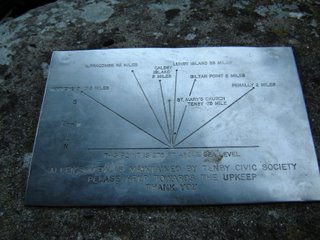




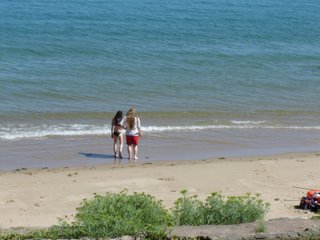
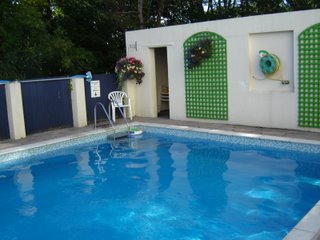




 The station has the usual Gifte Shoppe but also has an excellent cafe, where large, welcoming ladies provide home-cooked Cumbrian fare at very reasonable prices in portion sizes suitable for hikers. Not a beverage in sight, only drinks.
The station has the usual Gifte Shoppe but also has an excellent cafe, where large, welcoming ladies provide home-cooked Cumbrian fare at very reasonable prices in portion sizes suitable for hikers. Not a beverage in sight, only drinks. The journey takes about fifty minutes to get to Ravenglass. I was lucky and sat in one of the open carriages at the very back of the train, which gave me wonderful views of mountains, woodland and finally estuary as we approached Ravenglass, which is a little village with a rather end-of-the-world feel and an interesting old petrol pump in someone's garden, clearly dating from the days when petrol was more reasonably priced:
The journey takes about fifty minutes to get to Ravenglass. I was lucky and sat in one of the open carriages at the very back of the train, which gave me wonderful views of mountains, woodland and finally estuary as we approached Ravenglass, which is a little village with a rather end-of-the-world feel and an interesting old petrol pump in someone's garden, clearly dating from the days when petrol was more reasonably priced: In the 1960s I found a St Christopher medallion on the beach at Ravenglass, which delighted me. Ravenglass gained its fifteen minutes of fame in the 1980s. It is, of course, just along the coast from
In the 1960s I found a St Christopher medallion on the beach at Ravenglass, which delighted me. Ravenglass gained its fifteen minutes of fame in the 1980s. It is, of course, just along the coast from 


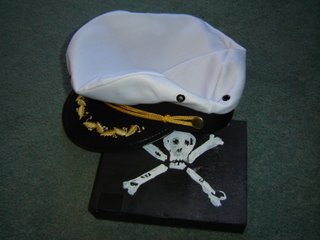




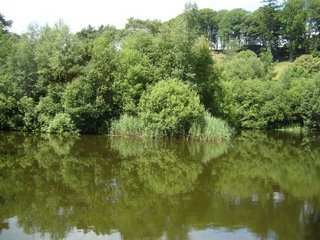

 I loved it. But then, a lot of the time we were swimming in the River Esk near Boot in the Lake District, which was stunningly beautiful and has not changed at all since those days. Here is the pool where we used to swim:
I loved it. But then, a lot of the time we were swimming in the River Esk near Boot in the Lake District, which was stunningly beautiful and has not changed at all since those days. Here is the pool where we used to swim:







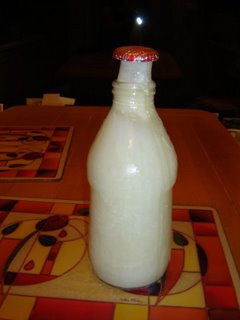





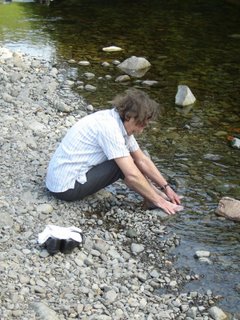 and swung on the swings at Broughton-in-Furness.
and swung on the swings at Broughton-in-Furness. A couple of years ago she went to the doctor for her annual check and encountered a doctor who didn't know her.
A couple of years ago she went to the doctor for her annual check and encountered a doctor who didn't know her.


